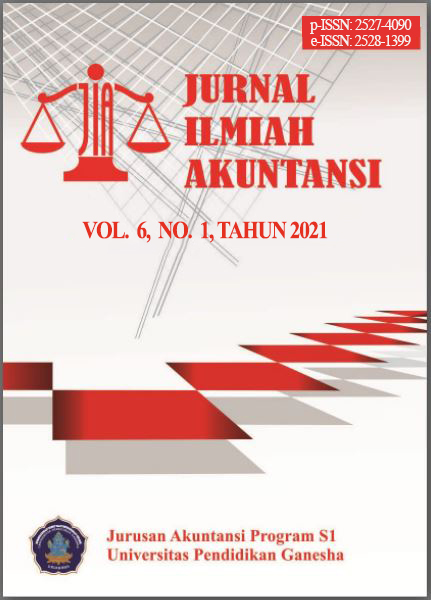Belanja Oportunistik Pemerintah Daerah pada Masa Pemilihan Kepala Daerah di Indonesia (Studi pada Pemilihan Kepala Daerah Non-Jawa)
DOI:
https://doi.org/10.23887/jia.v6i1.30530Keywords:
head region elections, incumbents, opportunistic spendingAbstract
This article analyses opportunistic behaviour of local government spending in period the elections for non-Javanese local heads in Indoensia which have variability in financial performance. Previous studies have shown that the opportunistic behaviour of regional spending is closely related to the holding of local head elections and the presence of incumbents running for reelections. The effect of election and the existence of incumbents in elections on local government spending is tested using a set of panel data for the 2015-2018 period. A total of 858 observation units were tested, consisting of political and financial factors in the pre-election year, election year, and post-election year. Based on the results of regression testing, it is found that evidence of non-Javanese local government spending is opportunistic around local head elections. This condition is indicated by the increase in Grant and Financial Assistance Expenditures, which are discretionary spending. This evidence confirms some previous research on opportunistic spending behaviour around local head elections.
References
Arifin, T., & Purnomowati, N. H. (2017). Government expenditure, political cycle & rent-seeking. International Journal of Business and Society, 18(3), 461–468.
Benito, B., Guillamón, M. D., & Ríos, A. M. (2017). The electoral budget cycle on municipal waste collection expenditure. Applied Economics, 49(41), 4161–4179. https://doi.org/10.1080/00036846.2016.1276278
Castro, V., & Martins, R. (2016). Are there political cycles hidden inside government expenditures? Applied Economics Letters, 23(1), 34–37. https://doi.org/10.1080/13504851.2015.1047084
Chortareas, G., Logothetis, V., & Papandreou, A. A. (2016). Political budget cycles and reelection prospects in Greece’s municipalities. European Journal of Political Economy, 43, 1–13. https://doi.org/10.1016/j.ejpoleco.2016.02.001
Foucault, M., Madies, T., & Paty, S. (2008). Public spending interactions and local politics. Empirical evidence from French municipalities. Public Choice, 137(1–2), 57–80. https://doi.org/10.1007/s11127-008-9312-z
Habibi, M., & Suswanta, S. (2019). Politics Discretionary Fund Budget of Regional Income and Expenditure Before and Election in 2015 in Samarinda City. Journal of Governance and Public Policy, 6(1). https://doi.org/10.18196/jgpp.61106
Nordhaus, W. D. (1975). The Political Business Cycle. The Review of Economic Studies, 42(2), 169. https://doi.org/10.2307/2296528
Pemerintah Indonesia. (2016). Undang-Undang Republik Indonesia Nomor 10 Tahun 2016 Tentang Perubahan Kedua Atas Undang-Undang Nomor 1 Tahun 2015 Tentang Penetapan Peraturan Pemerintah Pengganti Undang-Undang Nomor 1 Tahun 2014 tentang Pemilihan Gubernur, Bupati, dan Walikota Menjadi UMKM. NKRI.
Pemerintah Indonesia. (2019). Peraturan Pemerintah Nomor 12 Tahun 2019 tentang Pengelolaan Keuangan Daerah. NKRI.
Priyono, S. H., & Sastiono, P. (2019). Re-running Eligibility on Fiscal Spending Behavior: Evidence from Indonesian Municipalities. Jurnal Perencanaan Pembangunan: The Indonesian Journal of Development Planning, 3(1), 143–163. https://doi.org/10.36574/jpp.v3i1.62
Priyono, S. H., & Wagner, N. (2018). Political Budget Cycles At Subnational Level: Evidence From The Indonesian Simultaneous Regional Election In 2015. Jurnal Perencanaan Pembangunan: The Indonesian Journal of Development Planning, 2(3), 203–218. https://doi.org/10.36574/jpp.v2i3.38
Rahayu, F. I. S., & Fidiana, F. (2018). Derterminan Kualitas Opini Audit Pemerintah Daerah. Jurnal Akuntansi Multiparadigma, 9(2), 267–279. https://doi.org/10.18202/jamal.2018.04.9016
Repetto, L. (2018). Political Budget Cycles with Informed Voters: Evidence from Italy. Economic Journal, 128(616), 3320–3353. https://doi.org/10.1111/ecoj.12570
Republik Indonesia. (1945). Undang-Undang Dasar Negara Republik Indonesia Tahun 1945. NKRI.
Ritonga, I. T., & Alam, M. I. (2010). Apakah Incumbent Memanfaatkan Anggaran Pendapatan dan Belanja Daerah (APBD) untuk Mencalonkan Kembali Dalam Pemilihan Umum Kepala Daerah. Simposium Nasional Akuntansi XIII Purwokerto, 4, 1–25.
Rogoff, K., & Sibert, A. (1986). Elections and Maroeconomic Policy Cycles. NBER Working Paper Series 1838, 1–42.
Sakurai, S. N., & Menezes-Filho, N. (2011). Opportunistic and partisan election cycles in Brazil: New evidence at the municipal level. Public Choice, 148(1–2), 233–247. https://doi.org/10.1007/s11127-010-9654-1
Setiawan, D., & Rizkiah, F. (2017). Political budget cycles in municipalities: Evidence from Indonesia. International Journal of Business and Society, 18(3), 533–546.
Sjahrir, B. S., Kis-Katos, K., & Schulze, G. G. (2013). Political budget cycles in Indonesia at the district level. Economics Letters, 120(2), 342–345. https://doi.org/10.1016/j.econlet.2013.05.007
Veiga, L. G., & Veiga, F. J. (2007). Political business cycles at the municipal level. Public Choice, 131(1–2), 45–64. https://doi.org/10.1007/s11127-006-9104-2
Winoto, A. H., & Falikhatun, F. (2015). Indikasi Penyalahgunaan Discretionary Fund Dalam Anggaran Pendapatan Dan Belanja Daerah Menjelang Pemilukada 2015. Jurnal Akuntansi Dan Keuangan Indonesia, vol 11(1), pp 75–91. https://doi.org/https://doi.org/10.21002/jaki.2015.05



1.png)


